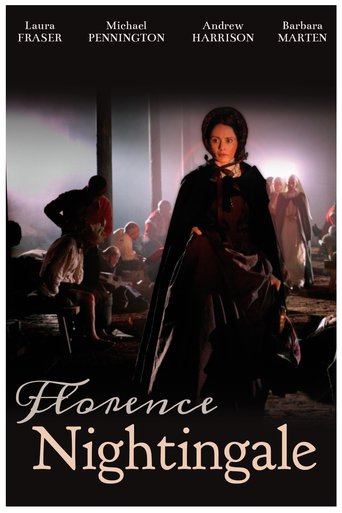wsmith123
I found the whole presentation to have the subtle influence of a Merchant/Ivory effort. Norman Stone's direction has taken a glossier feel with this production.Whether or not through intention, Stone has created a tacit contrast and balance between today's perceptions of modern medicine and the historic resonance of its bitter foundations. Through this, the film breathes with a certain relevance without feeling preachy or overly dry.Laura Fraser plays the part of Florence with a sort of volcanic fragility while staying true to the linguistic delivery style of the period. Other noteworthy efforts are delivered by Michael Pennington. Pennington conveys a realistic father void of the typical Victorian film noir caricatures that have all too often plagued period films. Editor Colin Goudie keeps the patent BBC presentation while allowing the film to feel at times like a larger screen effort. Composer Jeremy Soule delivers what may be the best opening theme in recent history for the BBC.If there is anything of fault with the film is that some important elements were implied rather than filmed. This may have been symptomatic of budgeting considerations with a production of this nature. It would have been nice to see more of Florence's life in this script, as an hour made the whole production feel slightly compressedIn conclusion, this film is a very worthy way to spend an hour for those that know nothing about the legendary Florence Nightingale. This may be the finest effort thus far to bring this story to the screen.
pawebster
The script was terrible. It was full of modern colloquialisms (e.g. the nation wants to 'move on') and people calling each other by their first names inappropriately for the period. Laura Fraser acted the part with a modern Sloane Ranger accent and entirely lacked the gravitas that Florence Nightingale clearly had. Her experience of nursing before going out to Scutari was omitted. Michael Pennington was terrible as her father, weak and totally un-Victorian.The time line of the piece was confusing and the music hall interludes were entertaining but out of place.The later parts, with Florence agonising over her mistakes, were overdone. It is true she made mistakes, but unless I am much mistaken, she did not agonise over them very much, but rather tended to remain very confident of her abilities and fixed in her opinions.
arenapuzzles
I found this production very entertaining. It's style was not unlike 'Oh, What A Lovely War', interspersing the real life drama ,with music-hall scenes, brilliantly led by Roy Hudd. Laura Fraser was excellent in the role of Florence Nightingale , showing her as a feisty yet tender character. Michael Pennington ,as Wen Nightingale was also well cast and he played his part with great sympathy. A special mention for a fine newcomer, Zoe Street-Howe, who's performance as the young Queen Victoria, I found most believable. I am sure we will see more of her. The switch from comedy, to very realistic hospital scenes,gave the production a lot more edge and underlined the futility of war.
jda28
Based on her true-life letters and memoirs (as the excessive opening declaratives inform us), 'Florence Nightingale' is a different kind of period-drama chronicling the feminist icon's early days and aspirations to become a nurse, and continuing to her subsequent breakdown following the aid she gave in the Crimean War.A major fault of this drama is the patchy, inconsistent writing; colloquialisms and informal conversation leave it seeming out of touch with the era, and grating fantasy sequences seem to have been freshly picked out of a badly performed pantomime. The director's unwise decision to inter-cut between time eras so frequently also only results in unnecessary confusion, and breaking the fourth wall in Nightingale's letters delivery fractures the illusion that what we are watching took place long before the present.Laura Fraser is bold and refreshing in the eponymous role, but she lacks the strength to fully-fledge her character – she could quite simply be any well-spoken women from the period, and I imagined someone such as Helena Bonham Carter or Olivia Williams would have been more suited to the role, fitting comfortably into the character of Florence Nightingale with more power and resonance. On a positive note, considering this is pre-watershed television, the director does manage to convey the horrific nature of battle rather well, and it is an interesting, often atmospheric take on a well-known figurehead. The Victorian aesthetics are also very well established, and there are some fine supporting performances among the rest of the cast.It's not a bad effort, but at a mere sixty minutes the drama felt far longer than necessary thanks to turgid pacing and a lack of fluency, cohesion and dramatic tension. There's nothing innovative or inspiring here, and with far better, more authentic period-drama available it seems an unexciting, bland waste of an hour.



